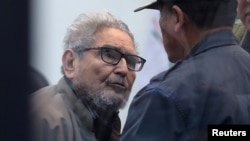A Peruvian court on Tuesday handed down a second life sentence to the founder of the Shining Path rebel group, Abimael Guzman, finding him guilty of orchestrating a car bomb attack in an upscale neighborhood of Lima in 1992 that left 25 people dead and 155 wounded.
The bombing on the residential street of Tarata was the Shining Path's deadliest attack on civilians in the capital, contributing to a sense of panic in the city about an insurgency that had already killed thousands of people in the remote Andes and Amazon.
Guzman, 83, is already serving a life sentence for terrorism since his capture in 1992. The trial over whether he was a mastermind of the Tarata bombing had been repeatedly delayed in the past four years, partly because Guzman said he was too ill to participate. He has denied involvement in the Tarata bombing.
His attorney, Alfredo Crespo, said before the sentencing that Guzman believes lower-level rebels carried it out without his knowledge.
According to Peru's truth commission, on July 16, 1992, Shining Path rebels left the car loaded with explosives on Tarata after being thwarted from parking it in front of a bank.
"I remember people running from one place to another, bloodied and shouting. It was horrible," Vanesa Quiroga, who lost her leg in the attack when she was 12, was quoted as saying in a 2003 report by the commission. "My mom ran around looking for my leg ... but she couldn't find it."
Guzman looked at the floor during much of the sentencing session that stretched for more than six hours, appearing to fall asleep at times.
Inspired by communist China's founder Mao Zedong, Guzman, a former philosophy professor who built a small, cult-like following that continues to revere him today, sought to incite a peasant rebellion in the Andes to overthrow the state and install a communist state.
An estimated 69,000 people, mostly in Peru's poor interior, were killed between 1980 and 2000 in the internal conflict launched by the Shining Path.
The Tarata attack was one of 37 car bombings in Lima in the first seven months of 1992, helping to build support for autocratic measures taken by former president Alberto Fujimori.
Fujimori was sentenced to 25 years in prison for ordering death squads to kill civilians in a counterinsurgency campaign, but was pardoned last year by former president Pedro Pablo Kuczynski, who resigned in scandal in March.
Several other former leaders of the Shining Path were given life sentences for the Tarata bombing at Peru's National Criminal Court on Tuesday.





